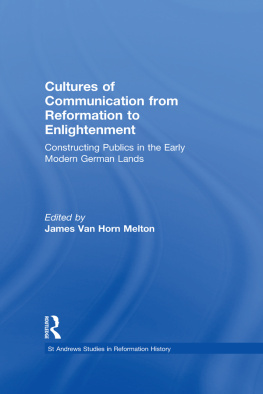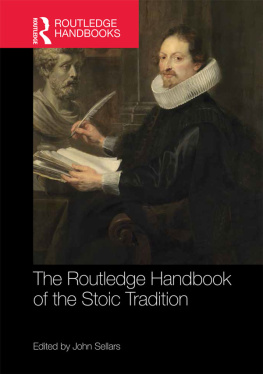ROUTLEDGE LIBRARY EDITIONS:
GERMAN HISTORY
Volume 20
THE DEVELOPMENT OF THE GERMAN PUBLIC MIND
THE DEVELOPMENT OF THE GERMAN PUBLIC MIND
A Social History of German Political Sentiments, Aspirations and Ideas The Middle Ages - The Reformation
FREDERICK HERTZ
First published in 1957 by George Allen and Unwin Ltd.
This edition first published in 2020
by Routledge
52 Vanderbilt Avenue, New York, NY 10017
and by Routledge
2 Park Square, Milton Park, Abingdon, Oxon OX14 4RN
Routledge is an imprint of the Taylor & Francis Group, an informa business
1957 George Allen & Unwin Ltd
All rights reserved. No part of this book may be reprinted or reproduced or utilised in any form or by any electronic, mechanical, or other means, now known or hereafter invented, including photocopying and recording, or in any information storage or retrieval system, without permission in writing from the publishers.
Trademark notice: Product or corporate names may be trademarks or registered trademarks, and are used only for identification and explanation without intent to infringe.
British Library Cataloguing in Publication Data
A catalogue record for this book is available from the British Library
ISBN: 978-0-367-02813-8 (Set)
ISBN: 978-0-429-27806-8 (Set) (ebk)
ISBN: 978-0-367-24577-1 (Volume 20) (hbk)
ISBN: 978-0-429-28327-7 (Volume 20) (ebk)
Publishers Note
The publisher has gone to great lengths to ensure the quality of this reprint but points out that some imperfections in the original copies may be apparent.
Disclaimer
The publisher has made every effort to trace copyright holders and would welcome correspondence from those they have been unable to trace.
THE DEVELOPMENT OF THE GERMAN PUBLIC MIND
A Social History
of German Political Sentiments
Aspirations and Ideas
BY
FREDERICK HERTZ
The Middle Ages
The Reformation
FIRST PUBLISHED IN 1957
This book is copyright under the Berne Convention.
Apart from any fair dealing for the purposes of private
study, research, criticism or review, as permitted under
the Copyright Act 1911, no portion may be reproduced
by any process without written permission. Enquiry
should be made to the publisher.
PRINTED IN GREAT BRITAIN
in 10pt. Pilgrim type
by
EAST MIDLAND PRINTING COMPANY LIMITED
KETTERING, PETERBOROUGH AND ELSEWHERE
TO MY EDITH
Prov., ch. 31, v. 1031
THE term public mind is used here in the sense of the political and social feelings, opinions and aspirations of the various groups forming the German people, with special reference to those which have determined politics. In former times secular history dealt mainly with the political development of States, and since the principal criterion of States and politics is power, this led to the detailed presentation of struggles for power, which left not much space for public opinion, political ideals and ideologies. Attention was concentrated on the individuals engaged in these struggles, on rulers, statesmen and generals, though sometimes great thinkers, too, appeared in the background. In contrast to this approach other branches of historical research developed later; on the one hand the treatment of special fields such as law, arts, or economic life, and on the other hand schools embracing the general evolution of nations, with emphasis on civilization, cultural achievements and social relations. It was increasingly believed that the course of events was not exclusively, or principally, determined by the State and power politics, and that there was also a collective psychology moulding the mind of the makers of politics. While the older type of political history emphasized the part played by great leaders, the new schools laid great stress on forces such as collective mentalities, tradition and the unfolding of the human intellect, conscience and sentiment, but also on their geographical background. The moving forces were sought in dominant ideas, the spirit of the ages, the evolution of the mind in successive phases, the character of nations, the Volksgeist, the ethos of lites or the interest of classes. Many of the attempts, however, were influenced by philosophical or psychological presuppositions leading to un-empirical conclusions. Political historians in the present age give much more attention to public opinion than in former times, especially in monographs on particular epochs, problems and personalities.
This book regards the public mind not as a uniform and persistent force such as the alleged national character, or the public opinion much invoked by politicians. A nation shows a multitude of characters; there are forces striving to integrate them in a unity, and others working for disintegration. As a rule there is not a single public opinion, but a variety of divergent trends. The idea that the policy of a government or the deeds of great men sufficiently expressed the spirit of their whole nation has often led to disastrous errors. The aim of this study is to show what the various sections of the Germans of every rank and class were thinking of the ruling men, how far they supported or opposed them, what were their wishes, hopes and fears, prejudices, ideals and standards of right and wrong. The influence of foreign thought, and parallels with the development of other nations, also require attention.
The study of the collective mind must largely be based on other sources than State documents which usually say little about the opinions of classes without a voice in politics. But a great deal about them can be found in religious and legal writings, works of literature, broadsheets, the verses of minstrels, folk-songs and later in newspapers. The analysis of the mentality of ruling personalities shows the interaction between their individuality and the public mind.
In order to find space for the presentation of these facts it is necessary to cut down the recording of external events to the minimum needed to understand the function and movements of the public mind. But certain limits are set to this elimination by various considerations, among them being the fact that political theory and practical policy, even of the same party or nation, are often not in accord. This may be due to many reasons. The student of the public mind must follow both lines of development, the ideal and the practical. External events such as diplomatic manoeuvres or warlike actions require consideration when they imply questions of public psychology, but not if they are of a merely technical significance in the struggle for power.
The description of the public mind necessarily requires much space since the characterization of its trends in general terms is not enough. It may even be misleading because these terms usually are very ambiguous. A particularly grave danger is involved in the application of modern concepts to conditions of former ages. This book further does not restrict itself to treating the affairs of the German Empire, as is usual in comprehensive surveys, but takes at least some account of the history of the principal territories. The reason is that important features of the German public mind can only be studied in territorial history. The multitude of German territories, however, renders it impossible to devote more than a few lines to the treatment of most of them. Many other issues, too, could only be dealt with in the barest outline because they were not of primary importance for our subject but could not be omitted altogether without causing serious gaps in surveying the course of events.














